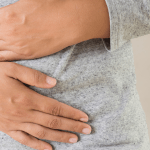Introduction to Menopause-Related Digestive Issues
Overview of Gas and Bloating in Perimenopause and Menopause
As women transition through perimenopause to menopause, they often encounter a variety of digestive symptoms, with gas and bloating being among the most common. These symptoms can be particularly troublesome during perimenopause, a phase marked by significant hormonal fluctuations. Bloating is characterized by a feeling of fullness, tightness, or swelling in the abdomen, which can lead to discomfort and distress. While bloating tends to decrease post-menopause due to the stabilization of hormone levels, it remains a concern for many during the transitional period.
The Impact of Hormonal Changes on Digestive Health
Hormonal changes play a pivotal role in the digestive health of menopausal women. Estrogen and progesterone, which see significant fluctuations during perimenopause, have a direct impact on the gastrointestinal tract. Estrogen, in particular, is known to influence water retention, thereby contributing to bloating. Additionally, these hormonal shifts can affect the motility and sensitivity of the gut, leading to symptoms such as gas, constipation, and diarrhea. As women progress into menopause, the decrease in ovarian hormone production can lead to a new balance in digestive function, often alleviating some of these symptoms.
Common Digestive Symptoms and Their Psychological Effects
Aside from bloating and gas, menopausal women may experience a range of digestive symptoms including abdominal pain, constipation, and diarrhea. These symptoms can mirror those of Irritable Bowel Syndrome (IBS) and can vary in intensity. The psychological impact of these symptoms should not be underestimated, as they can lead to increased stress, anxiety, and a decrease in quality of life. The gut-brain connection is well-documented, and the distress caused by persistent digestive issues can exacerbate menopause-related mood swings and emotional well-being. It is important for women to recognize these symptoms and seek appropriate lifestyle adjustments or medical advice to manage their digestive health during this transitional phase.
Natural Remedies for Gas and Bloating
Importance of Eating Habits and Mealtime Practices
Adopting mindful eating habits can significantly alleviate gas and bloating during perimenopause and menopause. Chewing food thoroughly—about 30 times per bite until it becomes almost liquid—can aid in digestion and reduce the formation of gas. It’s also beneficial to eat in a relaxed environment, avoiding distractions and stressors that may lead to hurried eating and increased air swallowing. Additionally, avoiding the use of straws, chewing gum, and smoking can minimize the amount of air entering the digestive tract, which is a common contributor to bloating.
The Role of Probiotics in Digestive Balance
Probiotics play a crucial role in maintaining a healthy gut microbiome, which is essential for digestive balance. A supplement containing multiple strains of Bifidobacterium and Lactobacillus can help restore harmony in the gut. This can lead to a reduction in symptoms associated with gas and bloating. It’s important to note that while starting probiotics, some individuals may experience an initial increase in bloating, which typically resolves as the body adjusts.
Lifestyle Adjustments to Reduce Swallowed Air
Making simple lifestyle changes can have a profound impact on reducing swallowed air, a common cause of bloating. Drinking directly from a glass rather than through a straw, avoiding carbonated beverages, and eliminating habits such as smoking and vaping can all contribute to less air being ingested. Additionally, being conscious of not talking while eating can prevent excess air from being swallowed.
Herbal Teas and Their Digestive Benefits
Herbal teas such as chamomile, ginger, peppermint, and anise have been traditionally used to ease digestive discomfort. These teas can soothe the digestive tract, reduce inflammation, and promote the passage of gas. However, it’s important to avoid anise tea if diarrhea is present, as it may exacerbate the condition.
The Use of Heat and Activated Charcoal
Applying a heating pad or hot water bottle to the abdomen can relax the muscles and facilitate the movement of gas through the intestines, providing relief from bloating. Activated charcoal supplements, taken before and after meals, can also help prevent gas accumulation. While the use of activated charcoal may lead to darkened stools, this is generally harmless. However, it’s always advisable to consult with a healthcare provider before starting any new supplement regimen.
In conclusion, these natural remedies can be effective in managing gas and bloating during perimenopause and menopause. It’s essential to approach these strategies with patience and to consider a personalized approach, as individual responses to remedies may vary.
By the way, something for you, a little gift!!!
I am just in the middle of publishing my book. It’s about How women can balance their hormones. One part is about food and diet, of course.
Follow this link and enter your email.
I will send you this part of the book for free once the book is published. It has many concrete, practical tips and recipes and will help you feel better during menopause or times of Big hormonal fluctuations.
Annette, Damiva Lead for Health & Wellness

Dietary Considerations and Adjustments
Identifying and Avoiding Trigger Foods
One of the first steps in managing gas and bloating during perimenopause and menopause is to identify and avoid foods that trigger these symptoms. Common culprits include high-fat foods, certain vegetables known to cause gas (such as broccoli and cauliflower), dairy products, and overly processed foods rich in sugar and salt. Keeping a food diary can be an invaluable tool in pinpointing which foods exacerbate bloating and gas. Once identified, these foods should be reduced or eliminated from the diet to help alleviate discomfort.
The Benefits of Organic Vinegar and Fennel Seeds
Organic vinegar, particularly apple cider vinegar, has been touted for its potential digestive benefits. Incorporating a small amount of organic vinegar into your diet may aid digestion and help reduce bloating. Fennel seeds are another natural remedy known for their carminative properties, which means they may help prevent the build-up of gas in the gastrointestinal tract. Chewing on a pinch of fennel seeds after meals or sipping on fennel tea can be a simple yet effective way to combat bloating.
Understanding and Implementing the FODMAP Diet
The FODMAP diet is an elimination diet that has been shown to be effective in reducing symptoms for many individuals with IBS and related gastrointestinal issues. FODMAPs are a group of carbohydrates that are poorly absorbed in the small intestine and can cause excessive fermentation and gas production. By reducing the intake of high-FODMAP foods, such as onions, garlic, wheat, and certain fruits, individuals may experience significant relief from bloating and gas. It is important to approach the FODMAP diet methodically, often with the guidance of a healthcare professional or dietitian, to ensure that nutritional needs are met while identifying personal triggers.
Implementing these dietary considerations and adjustments can be a powerful strategy in managing gas and bloating during perimenopause and menopause. By being mindful of trigger foods, utilizing natural remedies like organic vinegar and fennel seeds, and exploring dietary approaches such as the FODMAP diet, women can take proactive steps towards improving their digestive health and overall well-being.
Exercise and Its Role in Digestive Health
Types of Exercise Beneficial for Digestive Function
Regular physical activity is a cornerstone of good health, and its benefits extend to the management of digestive symptoms experienced during perimenopause and menopause. Exercise can help to stimulate the intestinal muscles, aiding in the movement of food and gas through the digestive system, which can reduce bloating and gas pains. The following types of exercise have been found to be particularly beneficial for digestive function:
- Aerobic Exercise: Activities such as walking, jogging, swimming, and cycling can increase heart rate and breathing, which in turn can help to stimulate the contraction of intestinal muscles and promote regular bowel movements.
- Strength Training: Building core strength through exercises like planks, squats, and other resistance training can support abdominal muscles, which play a role in digestion and can help reduce the appearance of bloating.
- Stretching: Gentle stretching can relieve stress, which is often linked to digestive issues. Stretching the abdominal area can also help to ease tight muscles that may contribute to discomfort.
Yoga and Tai Chi as Tools for Managing Symptoms
Yoga and Tai Chi are mind-body practices that combine physical postures, breathing exercises, and meditation. These exercises are particularly effective for managing menopause-related digestive symptoms due to their focus on mindfulness, relaxation, and core engagement. Here’s how they can help:
- Yoga: Specific yoga poses, such as twists and forward bends, can massage the abdominal organs, helping to relieve gas and bloating. The practice of deep breathing in yoga can also reduce the stress that may exacerbate digestive issues.
- Tai Chi: This gentle form of martial arts improves flexibility and balance while promoting relaxation. The slow, deliberate movements of Tai Chi can help to reduce stress levels and may improve digestive function by enhancing the mind-gut connection.
Both yoga and Tai Chi encourage a focus on the present moment and bodily awareness, which can help individuals become more attuned to their digestive processes and recognize early signs of bloating or discomfort.
In conclusion, incorporating regular exercise, particularly aerobic activities, strength training, stretching, yoga, and Tai Chi, can play a significant role in managing digestive health during perimenopause and menopause. These activities not only improve physical well-being but also contribute to a better psychological state, which is intrinsically linked to digestive health. As always, it is important to consult with a healthcare provider before starting any new exercise regimen, especially if you have existing health concerns.
Understanding and Managing Digestive Disorders
The Prevalence of IBS and Its Relation to Menopause
Irritable Bowel Syndrome (IBS) is a common gastrointestinal disorder that affects a significant number of women, particularly during the perimenopausal and menopausal phases. Symptoms such as bloating, abdominal pain, and alterations in bowel habits can significantly impact quality of life. Research indicates that the prevalence of IBS may increase during menopause, with hormonal fluctuations playing a pivotal role. Estrogen and progesterone, which see significant changes during this period, are thought to affect gut motility and sensitivity, potentially exacerbating IBS symptoms.
SIBO, Intestinal Methane Overgrowth, and Other GI Challenges
Small Intestinal Bacterial Overgrowth (SIBO) and Intestinal Methane Overgrowth are conditions that can cause bloating and discomfort, and they are often associated with IBS. SIBO is characterized by an excessive bacterial population in the small intestine, leading to symptoms like gas, bloating, and diarrhea. Intestinal Methane Overgrowth, a subset of SIBO, is marked by an overabundance of methane-producing microorganisms, which can slow down transit time and cause constipation. These conditions can be particularly challenging during menopause, as the body undergoes significant hormonal and physiological changes.
The Connection Between Digestive Conditions and Hormonal Changes
The link between digestive health and hormonal balance is complex and significant. As women enter perimenopause and menopause, the decline in estrogen levels can lead to a decrease in the diversity of gut microbiota, which is crucial for overall digestive health. This hormonal upheaval can contribute to symptoms like gas, bloating, and constipation. Additionally, estrogen plays a role in cholesterol and glucose metabolism, and its reduction may lead to digestive issues. It’s important to recognize that these hormonal changes can exacerbate existing conditions like IBS or lead to the development of new digestive challenges.
Understanding these connections is vital for managing symptoms effectively. Women experiencing persistent or severe digestive issues during menopause should consult healthcare professionals for appropriate diagnosis and treatment. Personalized approaches, considering the unique hormonal and digestive profiles of each individual, are essential for effective management and relief from these uncomfortable symptoms.
When to Seek Medical Advice
Recognizing Symptoms That Require a Doctor’s Attention
While gas and bloating are common symptoms during perimenopause and menopause, certain signs should prompt you to seek medical advice. It’s essential to be vigilant about changes in your digestive health, especially if you experience:
- Persistent symptoms: If gas, bloating, or other digestive issues continue despite trying natural remedies and dietary adjustments, it’s time to consult a healthcare professional.
- Blood in stool: This could be an indication of a more serious condition, such as gastrointestinal bleeding or colorectal cancer.
- Unexplained weight loss: Losing weight without trying can be a symptom of various health issues, including digestive disorders.
- Severe or worsening symptoms: If your digestive discomfort is intensifying or becoming more frequent, it could signal an underlying problem.
- Troublesome nausea or vomiting: Persistent nausea or vomiting is not typical and should be evaluated by a doctor.
Don’t hesitate to reach out to your healthcare provider if you’re concerned about any new or worsening symptoms. Early detection and treatment are crucial for managing health conditions effectively.
Possible Tests and Diagnoses for Persistent Digestive Issues
When you visit your doctor with concerns about gas and bloating, they may suggest several tests to diagnose the cause of your symptoms. These tests can include:
- Blood tests: To check for infections, inflammation, and other conditions that might be contributing to your symptoms.
- Stool tests: To look for signs of infection, digestive disorders, or blood in the stool.
- Hydrogen breath tests: To detect lactose intolerance or bacterial overgrowth in the small intestine.
- Endoscopic procedures: Such as a colonoscopy or gastroscopy, to visually inspect the gastrointestinal tract for abnormalities.
- Imaging tests: Like ultrasound or CT scans, to get a detailed view of the abdominal organs.
Based on the results of these tests, your doctor can diagnose conditions such as irritable bowel syndrome (IBS), small intestinal bacterial overgrowth (SIBO), or other gastrointestinal issues that may be exacerbated by menopausal changes. A tailored treatment plan can then be developed to address your specific needs.
Remember, while lifestyle changes can significantly improve symptoms of gas and bloating during perimenopause and menopause, persistent or severe symptoms warrant professional medical evaluation. Your health and well-being are paramount, and a healthcare provider can help you navigate this transitional phase with the appropriate care and support.

Recommended by Health Care Professionals.
Loved by thousands of women who got their life back.
Conclusion: Managing Menopause-Related Digestive Symptoms
Summary of Effective Strategies for Symptom Management
Throughout the menopausal transition, many women experience an increase in digestive issues such as gas and bloating. Understanding the connection between hormonal changes and gut health is crucial for managing these symptoms effectively. Here are some strategies that have been discussed:
- Identify and avoid trigger foods: Foods high in fiber, sodium, and certain carbohydrates can exacerbate bloating. Keeping a food diary can help pinpoint specific triggers.
- Adopt mindful eating habits: Eating slowly, chewing thoroughly, and avoiding talking while eating can reduce the amount of air swallowed and, consequently, bloating.
- Incorporate probiotics: These beneficial bacteria can support a healthy gut microbiome, though it’s important to choose the right strains and consult with a healthcare professional.
- Stay active: Regular exercise, including walking and cycling, can improve gut motility and reduce bloating symptoms.
- Consider herbal remedies: Natural options like ginger and peppermint may provide relief for some women.
- Use heat and activated charcoal: These methods can offer temporary relief from discomfort.
It’s also important to recognize when symptoms may indicate a more serious condition, such as IBS or lactose intolerance, and to seek medical advice when necessary.
The Importance of Personalized Approaches to Digestive Health
While the strategies mentioned can be effective, it’s essential to remember that every woman’s experience with menopause is unique. Personalized approaches to digestive health are paramount. Factors such as race, ethnicity, and individual health history can influence the severity and type of symptoms experienced, as highlighted by recent studies.
Working with healthcare professionals to tailor a plan that considers personal dietary needs, lifestyle factors, and medical history is the best course of action. This may include specialized diets like the FODMAP diet, adjustments in hormone replacement therapy, or targeted probiotic supplementation.
In conclusion, managing menopause-related digestive symptoms requires a multifaceted approach that includes dietary adjustments, lifestyle changes, and possibly medical interventions. By understanding the impact of hormonal changes on the gut and implementing personalized strategies, women can find relief from gas and bloating during this transitional phase of life.












